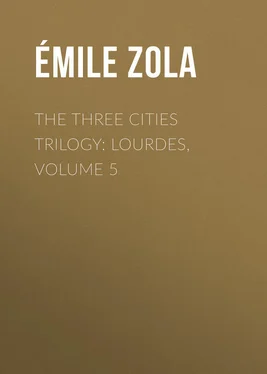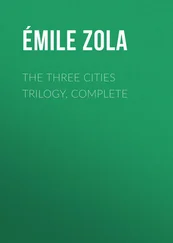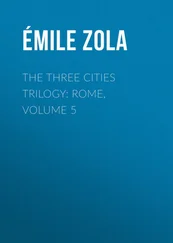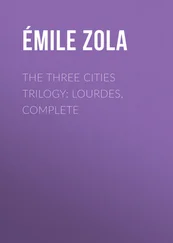Émile Zola - The Three Cities Trilogy - Lourdes, Volume 5
Здесь есть возможность читать онлайн «Émile Zola - The Three Cities Trilogy - Lourdes, Volume 5» — ознакомительный отрывок электронной книги совершенно бесплатно, а после прочтения отрывка купить полную версию. В некоторых случаях можно слушать аудио, скачать через торрент в формате fb2 и присутствует краткое содержание. Жанр: literature_19, foreign_antique, foreign_prose, на английском языке. Описание произведения, (предисловие) а так же отзывы посетителей доступны на портале библиотеки ЛибКат.
- Название:The Three Cities Trilogy: Lourdes, Volume 5
- Автор:
- Жанр:
- Год:неизвестен
- ISBN:нет данных
- Рейтинг книги:4 / 5. Голосов: 1
-
Избранное:Добавить в избранное
- Отзывы:
-
Ваша оценка:
- 80
- 1
- 2
- 3
- 4
- 5
The Three Cities Trilogy: Lourdes, Volume 5: краткое содержание, описание и аннотация
Предлагаем к чтению аннотацию, описание, краткое содержание или предисловие (зависит от того, что написал сам автор книги «The Three Cities Trilogy: Lourdes, Volume 5»). Если вы не нашли необходимую информацию о книге — напишите в комментариях, мы постараемся отыскать её.
The Three Cities Trilogy: Lourdes, Volume 5 — читать онлайн ознакомительный отрывок
Ниже представлен текст книги, разбитый по страницам. Система сохранения места последней прочитанной страницы, позволяет с удобством читать онлайн бесплатно книгу «The Three Cities Trilogy: Lourdes, Volume 5», без необходимости каждый раз заново искать на чём Вы остановились. Поставьте закладку, и сможете в любой момент перейти на страницу, на которой закончили чтение.
Интервал:
Закладка:
When M. de Guersaint had joined Pierre, who had remained a short distance off, he gave him the following explanation. "My dear fellow," he said, "it's a matter of conscience; I formally promised the coachman who drove us to Gavarnie that I would see his master and tell him the real cause of our delay. You know whom I mean – the hairdresser on the Place du Marcadal. And, besides, I want to get shaved."
Pierre, who felt uneasy at this proposal, had to give way in face of the promise that they would be back within a quarter of an hour. Only, as the distance seemed long, he on his side insisted on taking a trap which was standing at the bottom of the Plateau de la Merlasse. It was a sort of greenish cabriolet, and its driver, a fat fellow of about thirty, with the usual Basque cap on his head, was smoking a cigarette whilst waiting to be hired. Perched sideways on the seat with his knees wide apart, he drove them on with the tranquil indifference of a well-fed man who considers himself the master of the street.
"We will keep you," said Pierre as he alighted, when they had reached the Place du Marcadal.
"Very well, very well, Monsieur l'Abbe! I'll wait for you!" And then, leaving his lean horse in the hot sun, the driver went to chat and laugh with a strong, dishevelled servant-girl who was washing a dog in the basin of the neighbouring fountain.
Cazaban, as it happened, was just then on the threshold of his shop, the lofty windows and pale green painting of which enlivened the dull Place, which was so deserted on week-days. When he was not pressed with work he delighted to parade in this manner, standing between his two windows, which pots of pomatum and bottles of perfumery decorated with bright shades of colour.
He at once recognised the gentlemen. "Very flattered, very much honoured.
Pray walk in, I beg of you," he said.
Then, at the first words which M. de Guersaint said to him to excuse the man who had driven him to Gavarnie, he showed himself well disposed. Of course it was not the man's fault; he could not prevent wheels coming to pieces, or storms falling. So long as the travellers did not complain all was well.
"Oh!" thereupon exclaimed M. de Guersaint, "it's a magnificent country, never to be forgotten."
"Well, monsieur, as our neighbourhood pleases you, you must come and see us again; we don't ask anything better," said Cazaban; and, on the architect seating himself in one of the arm-chairs and asking to be shaved, he began to bustle about.
His assistant was still absent, running errands for the pilgrims whom he lodged, a whole family, who were taking a case of chaplets, plaster Virgins, and framed engravings away with them. You heard a confused tramping of feet and violent bursts of conversation coming from the first floor, all the helter-skelter of people whom the approaching departure and the packing of purchases lying hither and thither drove almost crazy. In the adjoining dining-room, the door of which had remained open, two children were draining the dregs of some cups of chocolate which stood about amidst the disorder of the breakfast service. The whole of the house had been let, entirely given over, and now had come the last hours of this invasion which compelled the hairdresser and his wife to seek refuge in the narrow cellar, where they slept on a small camp-bed.
While Cazaban was rubbing M. de Guersaint's cheeks with soap-suds, the architect questioned him. "Well, are you satisfied with the season?"
"Certainly, monsieur, I can't complain. As you hear, my travellers are leaving to-day, but I am expecting others to-morrow morning; barely sufficient time for a sweep out. It will be the same up to October."
Then, as Pierre remained standing, walking about the shop and looking at the walls with an air of impatience, he turned round politely and said: "Pray be seated, Monsieur l'Abbe; take a newspaper. It will not be long."
The priest having thanked him with a nod, and refusing to sit down, the hairdresser, whose tongue was ever itching to talk, continued: "Oh! as for myself, I am always busy, my house is renowned for the cleanliness of the beds and the excellence of the fare. Only the town is not satisfied. Ah, no! I may even say that I have never known so much discontent here."
He became silent for a moment, and shaved his customer's left cheek; then again pausing in his work he suddenly declared with a cry, wrung from him by conviction, "The Fathers of the Grotto are playing with fire, monsieur, that is all I have to say."
From that moment, however, the vent-plug was withdrawn, and he talked and talked and talked again. His big eyes rolled in his long face with prominent cheek-bones and sunburnt complexion sprinkled with red, while the whole of his nervous little body continued on the jump, agitated by his growing exuberance of speech and gesture. He returned to his former indictment, and enumerated all the many grievances that the old town had against the Fathers. The hotel-keepers complained; the dealers in religious fancy articles did not take half the amount they ought to have realised; and, finally, the new town monopolised both the pilgrims and the cash; there was now no possibility for anyone but the keepers of the lodging-houses, hotels, and shops open in the neighbourhood of the Grotto to make any money whatever. It was a merciless struggle, a deadly hostility increasing from day to day, the old city losing a little of its life each season, and assuredly destined to disappear, – to be choked, assassinated, by the young town. Ah! their dirty Grotto! He would rather have his feet cut off than tread there. Wasn't it heart-rending, that knick-knack shop which they had stuck beside it? A shameful thing, at which a bishop had shown himself so indignant that it was said he had written to the Pope! He, Cazaban, who flattered himself with being a freethinker and a Republican of the old days, who already under the Empire had voted for the Opposition candidates, assuredly had the right to declare that he did not believe in their dirty Grotto, and that he did not care a fig for it!
"Look here, monsieur," he continued; "I am going to tell you a fact. My brother belongs to the municipal council, and it's through him that I know it. I must tell you first of all that we now have a Republican municipal council, which is much worried by the demoralisation of the town. You can no longer go out at night without meeting girls in the streets – you know, those candle hawkers! They gad about with the drivers who come here when the season commences, and swell the suspicious floating population which comes no one knows whence. And I must also explain to you the position of the Fathers towards the town. When they purchased the land at the Grotto they signed an agreement by which they undertook not to engage in any business there. Well, they have opened a shop in spite of their signature. Is not that an unfair rivalry, unworthy of honest people? So the new council decided on sending them a deputation to insist on the agreement being respected, and enjoining them to close their shop at once. What do you think they answered, monsieur? Oh! what they have replied twenty times before, what they will always answer, when they are reminded of their engagements: 'Very well, we consent to keep them, but we are masters at our own place, and we'll close the Grotto!'"
He raised himself up, his razor in the air, and, repeating his words, his eyes dilated by the enormity of the thing, he said, "'We'll close the Grotto.'"
Pierre, who was continuing his slow walk, suddenly stopped and said in his face, "Well! the municipal council had only to answer, 'Close it.'"
At this Cazaban almost choked; the blood rushed to his face, he was beside himself, and stammered out "Close the Grotto? – Close the Grotto?"
"Certainly! As the Grotto irritates you and rends your heart; as it's a cause of continual warfare, injustice, and corruption. Everything would be over, we should hear no more about it. That would really be a capital solution, and if the council had the power it would render you a service by forcing the Fathers to carry out their threat."
Читать дальшеИнтервал:
Закладка:
Похожие книги на «The Three Cities Trilogy: Lourdes, Volume 5»
Представляем Вашему вниманию похожие книги на «The Three Cities Trilogy: Lourdes, Volume 5» списком для выбора. Мы отобрали схожую по названию и смыслу литературу в надежде предоставить читателям больше вариантов отыскать новые, интересные, ещё непрочитанные произведения.
Обсуждение, отзывы о книге «The Three Cities Trilogy: Lourdes, Volume 5» и просто собственные мнения читателей. Оставьте ваши комментарии, напишите, что Вы думаете о произведении, его смысле или главных героях. Укажите что конкретно понравилось, а что нет, и почему Вы так считаете.












